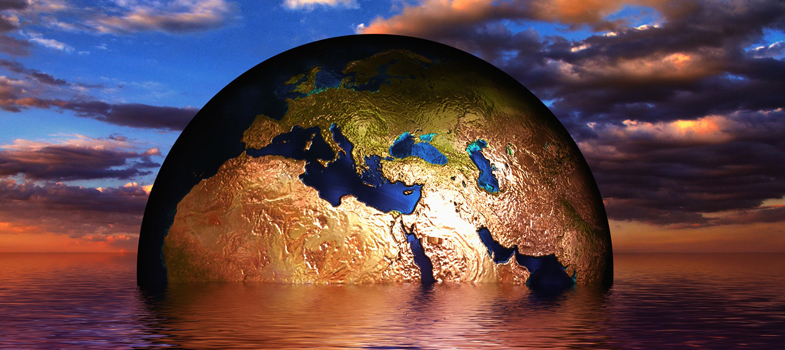1.3 The kinds of change that will be experienced in other parts of the world
Climate change affects ecological systems, and changes in ecological systems influence the processes of disease transmission. Changes in temperature and precipitation, as well as extreme climate events such as floods or droughts, are capable of changing ecological systems. Direct effects of climate change are increases in sea surface temperature and global sea level. As a result of rising sea levels, many coastal areas will experience increased flooding, accelerated erosion, intrusion of seawater into freshwater areas and the loss of wetlands. Other anticipated changes include those relating to wave conditions, ocean circulation patterns and decreases in sea-ice cover.
The impacts of climate change will vary from place to place around the world. We can expect more severe and frequent storms such as hurricanes, ice storms, heat waves, floods, droughts and wildfires. For example, wildfires are already frequent occurrences in places like Australia and the USA. There has also been more frequent flooding in the UK and many parts of Europe. Warmer temperatures will increase the range of disease-bearing mosquitoes in more tropical climates, while also increasing the range and numbers of insects and other agricultural pests, such as weeds. Melting glaciers and expanding sea water (water expands as it warms) will further raise sea level, inundating low-lying islands and flooding coastal areas, while warmer ocean temperatures will kill many of the world's coral reefs. Such events will no doubt affect our food supply, our access to clean water, our health, and the economic and social conditions of families and communities around the world.
As ecosystems become further stressed by climate change, species extinction will accelerate. Many of the species lost will be seemingly insignificant plants and insects, but we will also lose plants that we rely on for food and which could cure diseases, and large animals such as polar bears, which rely on winter ice as a platform to hunt for food. Warmer winters could mean reduced snow pack for some regions, such as Antarctica, Greenland, northern Europe and North America. The regional or national economic impacts of such changes could be significant.
Many such changes are already being seen around the world. For example, the number of weather-related disasters experienced worldwide every year has been increasing over the past few decades. During the course of the twenty-first century, average global surface temperatures are projected to increase at a rate unprecedented over at least the past 10 000 years, and scientists believe that rising temperatures could further increase the intensity and frequency of extreme weather events.
These Web-based resources provide more background information:
The Red Cross Red Crescent Climate Guide dated 2007, shows clearly how climate change will impact on poor and vulnerable countries.
Drought is one of the effects of global warming: Victoria in Australia is gripped by a drought that threatens to force farmers off the land.
The Exploring Earth website poses the question ‘How might global climate change affect life on earth?’ and discusses the impacts on:
coastal areas
health
forests
agriculture
species and natural areas
water resources, using the example of the Colorado River.
TVE's Earth Report has an article entitled ‘Adopt, adapt and survive’ that reports from the people most vulnerable to climate change, which are those in the developing world.
The Guardian article ‘The world's melting glaciers’ (16 pictures).
Reports by Oxfam on the various ways in which climate change is affecting the world, including the global economy.
From National Geographic, a hurricane-damaged home in Gulf Breeze, Florida.
The World View of Global Warming project's photographic documentation of climate change.
‘In pictures: How the world is changing’, from the BBC News Channel.
1.2 The changes I might be able to observe where I live in the UK
